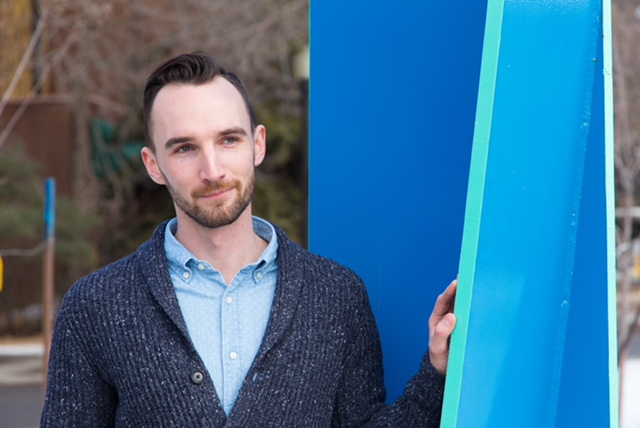
Class of 2019 MD student Derek Fehr is one of 2018's Alberta Council for Global Cooperation Top 30 Under 30
Above and beyond the day-to-day challenges of being a successful medical student, Derek Fehr's commitment to advocating with marginalized people in the health-care system makes a person wonder when he finds time for sleep. Fehr was recently named one of 2018'sAlberta Council for Global Cooperation Top 30 Under 30.
Fehr is involved with theEdmonton Men's Health Collective-a local grassroots health organization, is president of the Sexuality and Gender Advocacy Committee as part of the U of A Medical Students' Association, and is currently leading the executive team for the U of A's student-led fifth annual Inclusive Health Conference upcoming on March 10.
"Actually one of the things that I'm most proud of is the work that I've done directly with the MD program under Dr. Helly Goez," Fehr said.Goez is the Faculty of Medicine & Dentistry's first assistant dean, diversity and director of the MD program's four-year physicianship course.
Opening up a 'human library' for medical students
Inclusive Health Conference
Tickets are now available for the fifth Annual Inclusive Health Conference on March 10, 2018 at Lister Centre.
Keynote speaker Dr. Lori Ross, Associate Professor of the Dalla Lana School of Public Health at the University of Toronto and Affiliate Scientist with the Center for Addiction and Mental Health, is presenting on "Bisexuality: Addressing the 'B' in Health Care Contexts."
For the last two summers, Fehr has worked closely with Goez and in collaboration with the MD program, the Equity Diversity Inclusion (EDI) office in U of A Human Resources, the Community Social Work Team, other student colleagues and various community members to develop a new LGBTQ curriculum.
"We've created about six hours of new content for the U of A medical school, including a morning session where we recruited around 25 LGBTQ volunteers from the community for a 'human library,' to share their experiences of stigma and discrimination with our learners, how it has impacted their health, and what experiences they've had with health-care providers," Fehr said. "Based on the preliminary feedback we've received this was really impactful for our students."
Fehr says his personal experience led him to recognize gaps in care for LGBTQ patients when he was considering medical school.
"One of the things that changed a lot for me when I moved to Edmonton is that I came out and was very open about being gay, and that whole process was transformative. Once I was sure that I wanted a career in health care, I did some reading on the health disparities in the LGBTQ community, and learned that about the significant barriers to positive health outcomes. That really struck a chord with me," said Fehr.
"The experiences of discrimination that I had personally experienced were actually very strongly correlated with negative health outcomes and chronic diseases, infections, and psychosocial health. And I'm actually very privileged to have the support and resilience to achieve something like getting into medical school."
From musician to future physician on the wards

Fehr grew up in a rural town in Saskatchewan, where the future he imagined for himself looked much different. His love of music brought him to the University of Alberta's Department of Music in the Faculty of Arts where be obtained his Bachelor's degree in music, a subject he has always loved.
"I didn't have a lot of exposure to medicine. Nobody in my family was a physician or anything like that, so I never even conceived of that as a possible career for me. Moving to Edmonton and being exposed to more diversity made me realize that I had a really small view of what I could achieve. So I started exploring other options, and I volunteered as an artist playing music on the wards in my second year of my undergrad degree. And the more I went along with that the more it started to click, and then thankfully the application process went smoothly."
Shifting perspectives on LGBTQ health care
As a member of the 2019 graduating class, Fehr is weighing his options for a future specialty, but he knows he wants to advocate for LGBTQ patients within the health care system.
"I'm very passionate about health for the LGBTQ community, and for the last several years, whenever we talk about LGBTQ health there's a lot of focus on transgender health, because that's where the largest and most glaring disparities are―when we look at even just overall mortality and exposure to violence. The experience of discrimination and bias within health care is really glaring and that's unacceptable. So whether I go into psychiatry or family medicine, I want to work with closely with the trans community."
According to Fehr, changing the way medical students and health-care practitioners are trained is a step in the right direction. Fehr says he is excited about the ongoing work happening with the LGBTQ curriculum, and wants to make sure that people within the Faculty of Medicine & Dentistry will continue to develop it. He points to the annual Inclusive Health Conference as a means to keep those issues at the forefront.
"For the fifth annual conference this year, we've got some excellent speakers coming here includingDr. Lori Ross, a professor from the University of Toronto, delivering the keynote. She'll talk specifically about health disparities within the bisexual community," he highlighted. "For the first time, the conference will also feature a hormone replacement training session and a poster session featuring LGBTQ+ health research."